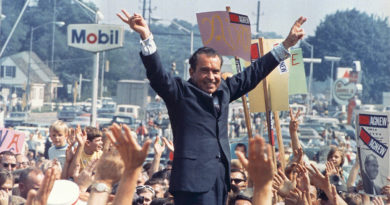Doug Manchester
Manchester: San Diego’s Cheerleader in Chief
It’s early morning and Doug Manchester is sitting at a corner table in the ornate private dining room at the $300 million Grand Del Mar. He owns the place and looks the part.
The fireplace is burning, and he puts his napkin in his lap as he sips a foamy vanilla latte. A copy of the U-T San Diego rests beside him. He owns that, too. He bought the newspaper company for roughly $110 million last November. One of the perfectionist’s first changes at the newspaper? He hired more janitors.
Like the gold leaf trim and imported marble blanketing the resort around him, every detail about Manchester feels meticulous: dyed brown hair, fixed in place; dress shirt, top two buttons unbuttoned, a bit of chest exposed; white handkerchief peeking out of his blue blazer pocket; khakis, perfectly pressed.
Manchester swats aside my first question. He wants me to know the words he lives by: “Making positive memories.” He thinks it should be part of his newspaper’s mission statement. This reminds him of a favorite poem. Unprompted, he begins from memory:
When you get what you want for struggling for self,
And the world has made you king for a day,
Then go to the mirror and look at yourself,
And see what that man has to say.
For it’s not your father, or mother,
Whose judgment must pass,
The verdict which counts most in life,
Is the man staring back from the glass.
You may be like Little Jack Horner and chisel a plum,
And think you’re a wonderful guy,
But the man in the glass says you’re only a bum,
If you can’t look him straight in the eye.
Few San Diegans could have evoked the visceral cancel-my-subscription-today reaction that Manchester did when he bought the Union-Tribune. He has a reputation: egomaniacal, short-tempered, litigious, unrelenting. Some fear him. Two politically connected people warned me not to write a negative word about him. “If there is a hell, Doug Manchester is the face of it,” one said.
No Middle Ground
Douglas Frederick Manchester leaves little middle ground. This is how he deals with it.
“There’s always going to be people who may be jealous,” he explains. “As long as you don’t cheat the man in the glass, you can live your life to the fullest. I get up every morning and tell myself, ‘Hey, Papa Doug, this is the first day of the rest of my life. Let’s live it to the fullest. Like it’s the Super Bowl, only without any timeouts or instant replays.’”
Manchester is 69 years old. He is a developer, a Catholic, anti-tax, Mitt Romney-supporting Republican. He’s shorter than you’d expect, with steel-blue eyes. He drives a four-door Porsche Panamera (the fastest car he could find, he says). Everyone from his restaurant staff to Romney calls him Papa Doug. He insists. It’s how he signs his name. (He explains it’s to distinguish himself from his son, Doug.)
He is famously wealthy. He spent $200,000 on his 65th birthday party at his namesake Manchester Grand Hyatt in 2007, then jetted to Costa Rica for a lavish week-long cruise ($350,000) aboard a 165-foot yacht. His wife’s estimate of their monthly utilities bill at their former home ($7,000) is more than most San Diegans’ monthly home payments. His bank accounts in 2009 held more than $56 million. And that was just his cash.
Now he is the publisher of San Diego’s largest newspaper. The purchase marks a bold entrée into the city’s cultural establishment by someone who’s not only lived outside of it. He’s also been one of its biggest targets.
Manchester has today appointed himself San Diego’s top “cheerleader.” The U-T gives him a significant platform for this civic rah-rah-rah, even if its influence has waned in the post-print age. The news staff is half of what it was five years ago. The opinion page stopped taking the strong positions that once made it a lightning rod. But in one day in November, the man who calls himself Papa Doug made America’s eighth-largest city wonder, Just how much power remains in the 143-year-old newspaper? And will he use it as a bullhorn — or a bludgeon?
A New Phase
Manchester says he’s entered a new phase of his life. It’s how he explains away old stories about his tirades and temper. They’re in the past, he says. His partner, John Lynch, CEO of the newspaper and the L in MLIM (Manchester Lynch Integrated Media), the company that technically owns it, agrees. Lynch describes him with a phrase you don’t often hear people say about a man who’s nearing 70: “I think he’s grown and matured.” The man who’s been called “Papa” for more than two decades would have you believe he’s finally acting the part.
“He loves our city,” says Lynch, a former sports radio executive. “I can see how people get put off because he is aggressive and doesn’t put up with crap. And there’s a lot of crap in our city right now. There was a time when we were a real shining light, a city that was growing and exciting. We lost all of that. And we’ve got to get it back.”
Manchester, too, is poised for a revival. His most notable projects are decades old. He recently endured a very public separation from his wife. He took a political beating by donating money to defeat gay marriage. The U-T marks his opportunity for redemption. It’s his chance to prove to all the haters that he loves not just the man in the glass, but San Diego, too.
The newspaper has been fighting for its life since 2006. Former owner David Copley sold low following the depths of the recession in 2009, dumping the paper that had been in his family for generations. Platinum Equity, a Beverly Hills-based buyout firm, spent two years making it profitable, then flipped it to Manchester. Platinum stopped the freefall, but the U-T’s long-term viability is still in question. Analysts expect U.S. newspaper advertising revenues to drop about 8 percent this year to $25 billion, roughly half what it was in 2008.
The city faces a challenging, decisive year, too. San Diego will elect a new mayor. Voters will decide on a major pension reform initiative. Unemployment is still high, local schools are on the brink of insolvency, and the city budget faces yet more cuts.
And yet Manchester says he wants to focus on “positive news” and champion big building projects. And considering the dreary financial outlook for news in print, Manchester, a savvy businessman, admits he has more planned for the company than pushing the newspaper online.
He also wants to eventually develop the prime Mission Valley parcel on which the paper’s headquarters sit. The parking lot could become condos, offices, or shops, all with convenient freeway access. Gary London, a local real estate analyst, says the land’s long-term prospects are clearer than the newspaper’s.
“The greater risk is on the media part of the acquisition. The lesser risk is on the real estate,” London says. “But to be the real estate mogul and media mogul in this town, it had to be irresistible to him.”  (Manchester’s Pacific Gateway at right).
(Manchester’s Pacific Gateway at right).
A solid real estate investment with the added bonus of the power of publicity? Manchester insists that’s not the case. His goal, he claims, is simpler.
Toasts, Not Roasts
“I never go to roasts anymore,” he says. “I don’t like it. I like to go to toasts. I like to toast people and to look at what’s right and good in San Diego and maybe not what’s negative.
Like when you’re running, he says. When you pass someone and smile, he says, they smile back. If you don’t, they don’t either.
“I hope we can smile at San Diego,” he says.
So far, a skeptical city hasn’t smiled back.
Neither Manchester nor Lynch has run a newspaper before. And it has shown.
On the day the sale was announced, Lynch said he wanted the paper’s sports page to call out opponents of a new downtown football stadium as “obstructionists.” The misstep elicited nationwide criticism. “Ugh,” tweeted Judy Battista, The New York Times’ football reporter. “Disturbing story,” tweeted Richard Deitsch of Sports Illustrated.
Now, after becoming the CEO of a major newspaper company, Lynch acknowledges the opinion page, not the sports page, is the correct forum for that type of attack.
“To make those proclamations was misguided on their part,” says Dean Nelson, director of the journalism program at Point Loma Nazarene University. You’d think a paper as large as the U-T wouldn’t be run by someone who’s learning on the job, he says. “But that’s apparently what he’s doing.”
Manchester certainly isn’t the first bombastic ideologue to buy a local newspaper and elicit jeers. Philadelphia groaned when Brian Tierney, a local public relations executive, bought that city’s major newspapers in 2006. He was a prominent Catholic who’d severely criticized the newspapers’ coverage of the Catholic Church sex abuse scandal there. But he addressed his reputation directly. On his first day of ownership, Tierney declared that he would guard the papers as a public trust and signed a pledge not to interfere with news coverage. The city ultimately lauded him as a hero who fought (unsuccessfully) to keep the papers out of the hands of bankruptcy creditors.
News Independence
Manchester and Lynch have made only reactionary pledges about news independence. Their early missteps don’t bode well, says Ken Doctor, a media analyst with Newsonomics.
“I don’t mind the personality and bombast and boosterism, as long as you understand that journalism is about telling people what’s really going on on all sides of a story as fairly and truthfully as you can,” Doctor says. “I was troubled by those first comments.”
The paper gave its new owner an early break that other community members don’t receive. On Christmas Day, he wrote a greeting to readers putting his Christianity front and center. “No other individual, before or since, has so influenced mankind as Jesus Christ,” he wrote. Online commenters questioned whether he was excluding other religions — until the comments were closed and erased.
Lynch has been the one to articulate the clearest view of the U-T’s digital future. He says he, not Manchester, raised the idea of buying it. He met with Manchester last summer to talk about the underlying real estate’s value. By the end of an hour-long breakfast at the Grand Del Mar, the two had agreed on a plan to buy it. They say the economics made sense. But they also wanted to be players.
Manchester, known as a tough negotiator, threatened to walk away from the deal twice. Once over the price and again over the newspaper’s pension obligations for retirees. He talked the price down. But he got stuck with its pension responsibility, a substantial risk.
They wouldn’t sell it any other way, Lynch says. “We committed to a couple of things we shouldn’t have,” he says. “We gave on like 20 different issues. He wanted the deal done.”
Manchester and Lynch are already leaving a clear mark on the newspaper. They’ve renamed it U-T San Diego. They instituted a dress code and patched the office walls. They replaced the paper’s old motto, which stressed it was still important (“More Than 1,000,000 Readers Weekly”), with one that highlights their jingoism: “The World’s Greatest Country & America’s Finest City.” They enlarged the American flag adorning the front page and named the U.S. Marine the “person of the year” for 2011.
Their aims sound almost Murdochian. They want to bring television and radio stations into the U-T building. Manchester says he might like to buy the region’s other major paper, the North County Times, too.
I had asked Lynch and Manchester to sit down for interviews at the paper’s wood-paneled executive offices on the top floor. They declined.
“It’s almost like a fortress,” Lynch later told me. “Very few offices. It’s like they didn’t want to be with the masses. That’s not the way we’re going to operate. We’re going to get very involved.”
He answers his cell phone as he always does.
“Papa Doug.”
His voice sounds low and breathy, like he’s talking in a library. He’s waiting to check into a hotel.
“I’m in Saudi Arabia right now,” he volunteers. “I suggest you call John Lynch. I’ll be back in a couple of days.”
Click.
Three days later, Manchester is back in San Diego, apologizing that he couldn’t talk. He’d spent a long day with a group of CEOs touring oil fields at the invitation of the Saudi kingdom.
Man About Town
Manchester knows people everywhere. But ask who the best person in town is to tell a “Papa Doug story,” and they’ll point you to a public official who served four mayors ago. Or port officials who are dead. Or someone who only remembers vague details.
Louis Wolfsheimer, then serving on the Port Commission, remembers getting invited to Manchester’s skyscraper suite for a drink decades ago. Manchester made a pitch: He wanted to use cheaper materials on a downtown hotel project, and he needed Wolfsheimer to support it and convince other board members, too. Wolfsheimer refused. Manchester yelled. Wolfsheimer yelled back. “Strong words were used,” is all Wolfsheimer would say.
Some 20 years later, Manchester snapped to attention when I mentioned the fight. Wolfsheimer had forgotten which hotel they argued about (the Grand Hyatt). Manchester remembered like it happened yesterday. But it didn’t.
Manchester left his mark on San Diego decades ago, most notably at the waterfront hotels he built in the 1980s and 1990s.
The Grand Hyatt is San Diego’s largest hotel and the West Coast’s tallest waterfront hotel. The Marriott Hotel & Marina helped pioneer the city’s waterfront convention tourism business. When it opened before the delayed Convention Center it was meant to serve, Manchester sued San Diego’s port district, a late 1980s lawsuit that people still talk about. He settled for more than $11 million.
Lately, though, his attempt to transform dilapidated downtown Navy property into offices and retail space languished. And the posh Grand Del Mar resort (which is in Carmel Valley) opened during the recession and hasn’t attracted as many guests as expected.
Still, Manchesters development portfolio is massive, an empire built from scratch. He arrived in Coronado at age 7 from Los Angeles when his father took a factory job with Rohr Aircraft Corp. in Chula Vista. After graduating from San Diego State, he sold insurance, began development work in La Jolla and Torrey Pines and, he says, retired by 1978. He flew a plane around the world, got bored and then launched into the hotel business.
As a boy, hawking morning newspapers to Coronado ferry passengers and looking across the bay toward downtown, Manchester says he never imagined the work he would do there.
The bay bridge didn’t even exist yet.
As we talked, Manchester looked at my wedding band and quizzed me about how I met my wife. There was a melancholy to his polite small talk. For years, Manchester styled himself as the ultimate family man. His wife, five children, and 10 grandchildren were his essence. He named ballrooms after them at his hotels, put up their pictures in his hotel lobby.
Manchester sold an intertwined identity: successful developer and family man. But the way he carried himself also came across as sanctimonious and helped feed allegations of his egotism. When he sold the Manchester Grand Hyatt last March for $570 million, he required his name to stay on it for 20 years. Why?
“Why not?” he said.
About Proposition 8
Now, the man who can afford to write a check to buy a newspaper company is without the family member who was so long identified with him: Betsy, his wife of 43 years. He says they are still friends, but they legally separated in 2010, a high-profile court case that attracted attention because of Manchester’s financial support for Proposition 8. At the same time he fought for the sanctity of marriage, he struggled with his own. He acknowledges it made him appear a hypocrite.
Manchester admits that he was unfaithful and fell in love with someone else. He talks in a hushed voice about it. “I did what I did, and it’s something that was a huge mistake,” he says.
He has apologized to the gay community for his Prop. 8 campaign donation, though the sting remains. Linda Perine, a local LGBT activist, says she worries about his control of the paper. “It’s of enormous concern when you have someone with a checkered past on LGBT civil rights take over a newspaper that’s never been noted for being particularly LGBT-friendly,” she says.
Manchester says he didn’t buy the paper to advocate for or against gay marriage.
“I’m not going to do anything with the press or with regards to ownership of the Union-Tribune that would take a position one way or another with that issue,” he says. “I’m through with that issue. I understand the hurt that the gay and lesbian community felt as a result of that. And I don’t want to cause hurt to anybody.”
The Manchesters sold their oceanfront La Jolla home for approximately $18 million, as part of the separation. Doug now lives in a home he built overlooking the 16th hole of Grand Del Mar’s golf course. The greens look lush, the rough is a wintry yellow. The man who’s worn his family on his sleeve says he’s dating again, but has no plans to get remarried. He gets up every morning, takes his black lab, Tita, for a jog, and says hello to what he calls “his family of workers.” He still sees Betsy at birthdays and Christmas.
This is his new phase of life. He insists that he’s happy. He promises that he wants that for San Diego, too.
With each newspaper that lands on the region’s doorsteps, we’ll find out just how committed Manchester is to that ideal.
This story also ran in the February 2012 issue of San Diego Magazine. Rob Davis is a senior reporter at voiceofsandiego.org. You can contact him directly at rob.davis@voiceofsandiego.org or (619) 325-0529.



